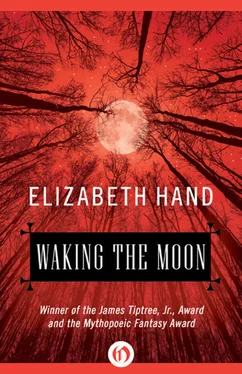This was the first time it struck me that there might be disadvantages to a happy childhood. Everywhere I looked there were people who belonged here. Longhaired sunburned girls in puckered cotton sundresses, stretched out on the grass and smoking black cigarettes. Long-haired boys who pulled clinking green bottles from a cooler and toasted each other in sure, joyous cadences. In the near distance, beneath the shadows of the immense and baroque Shrine itself, the tiny white-clad figures of nuns in their summer habits walked with heads thrown back, diamond light sparkling on their sunglasses. A heavyset man in a yarmulka stood on a set of curved steps that spiraled down from one of the Shrine’s promontories like a stairway in a Dr. Seuss book. As I watched he removed his yarmulka and absently patted his cheeks with it. The heat was intense. The oily scent of car exhaust wafting over from North Capitol Street vied with that of roses, which grew as profusely on the grounds of the Divine as within a public garden. My skirt hung limply about my knees, my long-sleeved cotton blouse felt heavy and moist as wet wool. As I dragged myself up the sidewalk to Rossetti Hall, a boy in a dashiki shirt bumped into me.
“Oops—sorry—” he mumbled, not even glancing aside as he hurried onto the lawn surrounding Rossetti Hall. Beneath one of its elaborate diamond-paned windows he stopped and bellowed “LINNNN—DDDDAA!” Above me windows flew open. Tanned faces stared down, laughing.
“Yo, Stephen,” a blond girl called lazily. “Like, shut up.”
No one took any notice of me at all. I flushed. My clothes burned against my skin. I looked away and ran up the steps and inside Rossetti Hall.
Somehow I got through that first weekend. My room turned out to be a surprisingly comforting haven, cool and quiet and mine alone. Like all of the buildings at the Divine, Rossetti Hall was a huge and Gothic edifice, vine-hung, sweet with the carnal scent of wisteria blossoms. Beneath its walls wandered a weird profusion of nuns and rabbis and sikhs and friars, and others of even more dubious spiritual provenance: Hare Krishnas, earnest Moonies, witches and druids nouveaux. The effect was superbly and spookily medieval, with color and comic relief thrown in by a small but noisy undergraduate population bearing the last battered standards of 1960s gambado. I was sorely aware of how drab I looked and felt.
My room was in a long corridor, cool and silent as an ice locker, even in these last weeks before autumn cast its phantom gold upon the city. I walked slowly down the hall, staring at my feet and trying to decipher the peculiar mosaic covering the floor. The tiles formed odd geometries in worn nursery colors, ducky yellow, little-boy blue, a nasty medicinal pink. The walls were a pale green that the years had treated more kindly, the plaster faded to a pleasant crème de menthe, with runnels of cream and chocolate where cracks had appeared. I spent a lot of time in that hall those first few days, waiting for someone to say hello, to invite me into another room. But the place remained strangely quiet. I was desperately lonely, my homesickness so intense I felt as though I’d been stabbed. Why hadn’t I wanted a roommate? Worse, it seemed that in spite of the Strong Suggestion in the orientation manual, I had arrived several days too early. The hall’s only other inhabitants were a trio of girls from Iran, distant relatives of the Shah, who were freshman engineering students. They spent their days brushing and plaiting one another’s long black hair, and their evenings on the floor’s single pay telephone, weeping and railing at the cruelty of their parents in sending them here.
I wished I could give myself over to such a luxury of grief. But when I called my parents I assured them all was well, school was great, my first class was Tuesday, Thanksgiving was not so far off, no really, everything was fine. Then I handed the phone back to the Iranians and returned to my room.
“Shit,” I said, and slouched into a chair.
It was a long and narrow room, with old wooden furniture that smelled of lemons and chalk. I shrugged out of my skirt and blouse, stood shivering while I tried to remember which bag held my clothes. Then I pulled on ripped jeans and black T-shirt, punted the skirt beneath the bed, and turned to survey my kingdom.
At the end of the room a huge arched window glowed whitish blue in the afternoon light. I stepped over a tangle of stereo wires and peered outside. The mullioned panes were of heavy whorled glass. The casements opened by means of an ornate cast-iron crank that shrieked when I tried to turn it, until I found and released the latch holding it closed. The window began to open, very slowly. Air heavy and thick and sweet as cane syrup flowed into the room. I leaned forward, my hands resting on the broad granite sill.
My room faced east and looked out over the Strand, the long sward of grass and trees that ran down the center of the campus. All the campus was spread before me like a huge board game tricked out in gold and green and marble. Archaic grey buildings and great spreading elms formed a gauzy tapestry in the late-summer light. The horizon was bounded by a heavily wooded hill, where the pale dome of another building poked through the greenery like the top of an observatory or the ruin of some ancient temple. Rows of tourist buses were parked beneath the trees. Directly beneath my window the students I had seen earlier still lolled in the grass and passed each other joints, while dogs rolled laughing and barking between them. Above everything loomed the Shrine, that brooding sphinx, wavering in the heat. The whole scene had the unreal aura of a tinted postcard of the World’s Fair. It never struck me that I could just have walked outside and been a part of it all.
But I could get a better look. I made certain the window was open as far as it would go. Then I swung out onto the ledge. For a perilous moment I crouched there like a gargoyle, until I caught my balance and scrunched up against one end of the window. My back butted up against something carved into uncomfortable points and angles. I wriggled until I felt more comfortable, then leaned forward to stare through the window and back into my room.
On the far wall hung a mirror. It showed me my reflection, a skinny figure like a goblin trapped in glass. Long legs in torn denim, bare ankles and feet betraying how unfashionably pale I was. Long arms with thin bony wrists, big hands, big feet, ragged fingernails. Limp shoulder-length black hair, straight and fine as a child’s. A wide milk white pixie face, distinguished mostly by large pale grey eyes and star-tilted nose, a few freckles, an engaging little gap between my two front teeth. Shanty Irish, my high school English teacher had once described me. I liked the description. At eighteen I fancied myself a spiritual daughter of Brendan Behan and Flann O’Brien, an able drinker and quoter of melancholy verse. My nose even had a nearly undetectable list to one side, where my brother Kevin had broken it during a childhood rout over Matchbox cars.
“Hey!”
I turned and looked down. Two boys throwing a Frisbee waved up at me. Clutching the edge of the window frame, I waved back.
“Come on down!” one shouted. I shook my head, yelled, “Later!”
Near them a girl reading a magazine flopped onto her side, shading her eyes until she sighted me, then waved languidly and looked away. The boys laughed, skimmed the Frisbee between them, and loped off across the grass.
So they were friendly; so there was hope. I sat there for the rest of the afternoon, my face tipped to the sun, daydreaming about my classes, trying to figure out how many days were left before Columbus Day weekend.
But finally the heat got to me. My shoulders hurt, too, from whatever the hell I was leaning against. I stretched, carefully so as not to fall, and crept back to the window. At the opening I hesitated, and craned my neck to see what made that damn wall so uncomfortable.
Читать дальше












